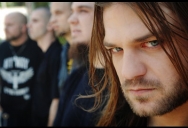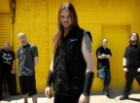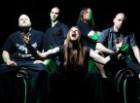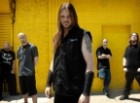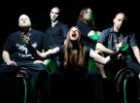Progressive/death metal band Into Eternity has just gotten back from Japan, where they were greeted by fans screaming band members’ names, lurking outside their hotel, and waiting at the bullet (train) station to get a glimpse. “They must’ve had walkie-talkies or something to coordinate where we were gonna be like that,” guitarist Tim Roth marvels. Back home in Saskatchewan, most people have never even heard of the band. And that’s okay with them. When they come home, says Tim, “If anything, we try to downplay our success.”
I sat down for a chat with Tim, the founding member who’s kept this band not only going but growing steadily more successful for over a decade. “It’s about (steps),” he comments. “The only way to success is longevity.”
Tim formed the group with Scott Krall and Jim Austin in 1997. Scott departed in 2004, and Jim in 2006, though Jim still contributes ideas; “He’s our sixth member,” Tim notes. The past decade has seen around a dozen different band members come and go, among them Rob Doherty, Danny Nargang and Chris Krall. It is undoubtedly Tim, the main songwriter in the band, who has been responsible for this group’s cohesive sound and a constant vision through these changes, through four albums, and through countless tours.
The lineup now consists of Tim on guitar, backing clean and death vocals; Stu Block (who joined in 2005 and appeared on 2006’s The Scattering of Ashes) on lead vocals; Troy Bleich on bass, backing clean and death vocals; and newest members, guitarist Justin Bender (formerly of Prince Albert) and Steve Bolognese on drums. All now reside in Regina except Steve, who’s from Boston MA. Tim recalls, “Steve would always come out to the shows and say he could play all our music…he was like a superfan…but we could tell even from his air-drumming, that he actually knew what he was talking about!” Steve eventually got the call. “He was a touring musician, and was just kinda waiting (for an opportunity like this),” says Tim. He laughs, “Of course, we tried to pick a guy who’s the furthest from Regina as possible.” Regarding Justin, Tim says, “He was one of the first (new members) that I didn’t have to sit down and teach all the parts to…he has a really good ear. We trade off guitar riffs, especially when I’m singing, as I’ve become more conscious of not compromising on my vocal parts (live).”
Fans have readily accepted Stu as the singer - many not even realizing that Tim sang leads on the first two albums. Tim admits lineup changes have been a challenge at times, as people want to see the same players on stage as they’ve heard on their favourite album. “We’ve had this band now for two years and seven major tours, but our upcoming album will be the first one that this lineup will be on.”
The Into Eternity sound is a unique hybrid of several metal forms, characterized by clean melodies on guitar or vocals, mixed up with multiple time and tempo changes and death vocals. Tim notes that they came up with their sound when they found certain genres too narrow: “I can’t listen to death vocals (on their own) endlessly; I have a short attention span! Instead we like to challenge both ourselves and the listener,” he says. “Compared to other bands in our genre, we’re actually a ‘lite’ band”. What you will find is a complex series of ideas in each song – incredibly intricate guitar lines, super-fast drum beats, death vocals and technically extreme changes, interwoven with chorus sections that have memorable, clean vocals. Tim laughs, “We feed you a small hook…and then we destroy it!”
melodies on guitar or vocals, mixed up with multiple time and tempo changes and death vocals. Tim notes that they came up with their sound when they found certain genres too narrow: “I can’t listen to death vocals (on their own) endlessly; I have a short attention span! Instead we like to challenge both ourselves and the listener,” he says. “Compared to other bands in our genre, we’re actually a ‘lite’ band”. What you will find is a complex series of ideas in each song – incredibly intricate guitar lines, super-fast drum beats, death vocals and technically extreme changes, interwoven with chorus sections that have memorable, clean vocals. Tim laughs, “We feed you a small hook…and then we destroy it!”
But this diversity in their music was once an obstacle. “It hindered us from getting signed back in ’96,” Tim explains. “They wanted us to narrow our sound and be one thing only (to be easier to market), but we wouldn’t do it. On top of that, grunge had just come in and wiped out metal. It hadn’t opened up to the degree it has now. Now - we fit in.”
The band took out a personal loan to bankroll their debut album in 1999, and simply started shooting out packages to labels and radio. As Tim notes, there weren’t as many options available to indie bands as there are now. Along the way, they picked up some airplay and buzz. On the strength of that initial self-titled project, the band signed with DVS (Holland) in 2000, and did a European tour. U.S. tours and many more European tours would follow.
Eventually, the band would find an ally in Steve Joh at Century Media, who persisted in playing their music around the office until those “small hooks” wound their way into the label boss’ head, and the band moved to Century with the release of Dead or Dreaming in 2002.
From the start, IE knew their key market was not in Saskatchewan - nor even Canada. “We signed with DVS, jumped into three European tours…then moved to Century Media - their head office is in Europe.” As an independent label, Century provides some support, but the band is pretty self-sufficient. “Of course the label helps push us along…we need to release something every two years or the kids will forget who we are.” He continues, “We’re very happy to be with them; it may sound strange that we aren’t hung up on getting a Canadian label, but it’s about our market. It’s pretty much a boys’ club (in the U.S. metal scene), so them having an L.A. office really helps us get tours. Our agent is also based in Hollywood.” A huge bonus is Century’s international distribution (umbrellaed under a major label), meaning IE is distributed in North America, Europe, Thailand and Japan, to name a few.
The band has performed in practically every U.S. state, and in all sizes of venues. A string of prestigious appearances included Gigantour (2006) with Megadeth; The Extreme The Dojo Vol. 20 festival, Japan (2008); Symphony X/Epica U.S. tour (2008); Dream Theater’s “Chaos in Motion” U.S. tour (2007); and bills with internationally renowned acts including Lamb of God, Opeth, Arch Enemy, The Haunted and Dark Tranquility. They’ve performed in the most unusual of locations, including Iceland (where they plan to perform again soon) and Serbia.
Tim highlights a favourite, an 11,000-capacity show with Dream Theater in Quebec City. “That is a good example of what is happening in our market,” he says. “Dream Theater can fill arenas on tour, yet only sell 100,000 albums (U.S.). SoundScan means nothing now…instead agents want to know numbers. For us, it’s about keeping track of attendance at our headline shows; the more attendance, the better tours we get.”
In contrast, IE has rarely toured in Canada. So the Summer Slaughter Tour, heading across the country August 15-27, will be a new adventure. The bill they share with Necrophagist, Dying Fetus, Beneath The Massacre, Neuraxis, Whitechapel, Veil of Maya, Divinity and Common Grave is going to include a Regina date – marking their first major show in their own hometown.
Tim knows that touring changes everything. “When you get signed and start touring…that’s what breaks up most bands. We were on the road 200 days last year. People get crazy when they go on vacation for a week…imagine that’s your entire life!” I remark that the band members have families at home, and that must be difficult. He replies, “If you’re a die-hard for music, you can make everything work. It’s definitely tough for bands to keep it together. But we had to keep going – we couldn’t cancel a tour just because we lost a member.” Tim recalls, “In 2003 we were on the road, sleeping in our van, splitting $50 a night with our agent. We lost two members after that tour. And I get it; if you’re not having fun on the road, what’s the point?”
Fortunately, the dues would soon start paying off. In 2006, IE joined the bill of Gigantour (a six-week U.S. touring festival founded by Dave Mustaine of Megadeth) alongside Megadeth, Lamb of God, Opeth, Arch Enemy, Overkill and The Smashup. (A DVD and CD of the tour were released in April ‘08, described as “over an hour of performances by iconic and influential heavy metal pioneers”.) While on that tour, Tim had the opportunity to introduce himself to one of his influences, Dream Theater’s Mike Portnoy, and give him a copy of the not-yet-released The Scattering of Ashes. Century had already sent Portnoy a copy of 2004’s Buried in Oblivion, and he remembered the band. Then, their manager also ran into Portnoy and pitched them for a tour. Those three nudges eventually resulted in their place on Dream Theater’s 2007 North American tour. “They were one band I’d always wanted to tour with. I’m still a fan – so I was blown away!” says Tim.
In another fortunate turn, the singer of Symphony X showed up at an IE show, and promptly promised them an opening slot. The next day their management got the call. IE joined their U.S. tour (2008), then traveled to Japan for the “Extreme the Dojo” tour thanks to their Japanese label Toys Factory and agent Smash West. As I ask how sales are in Japan (relative to the eager fans they encountered there), Tim replies, “We’re stocked prominently in Tower Records Japan…but I’m not sure how much is being pirated. If all the fans who were there had bought our album, technically we’d go platinum. But I guess CDs are more of a collectors’ thing now.”
Tim remarks, “We kinda do it the old Metallica way – just tour and get in peoples’ faces.” In fact, almost all their album sales are driven by touring. Ticket sales cover expenses, but it’s the merchandise that really pays the band, and Tim advises to put that income aside.
Their new album, The Incurable Tragedy, is due in August/September. It’s their first concept album, and is the story of a guy diagnosed with cancer. Considering the tragedies Tim and the band have faced in recent years, it will clearly be a deeply personal record. “It wrote itself,” Tim remarks.
In 2006, his two best friends and hardcore IE fans, brothers Danny Stephenson, 34, and Dave Stephenson, 36, died within three months of each other from complications resulting from a rare form of cancer. Tim says, “Danny and Dave should have been with our crew on the next tour; they wanted it as badly as we did, and we finally could have afforded to bring them along.”
Then last October, Tim’s dad Jack was diagnosed with cancer. Instead of the two-year window he’d been given, Jack Roth passed away just before Christmas, from complications resulting from a surgery that was supposed to have prolonged his life. Tim had already lost his mom Rose to cancer in 2003. “He went very quickly...I never thought both my parents would die from cancer.”
As he talks about his dad, Tim has a happy announcement to share: he’s just found out he and his girlfriend are expecting a baby. Shaking his head with a smile, Tim informs, “My dad was always on me to have kids!”
This spring “Diagnosis Terminal”, an unmastered new track, was posted on their MySpace page; Tim is pleased that fans already recognize the song at their shows. Tim wrote the chorus, and Justin came in with guitar riffs. Tim says, “The key I had my chorus in didn’t match the pitch of his new riffs, so we came up with the idea of having a chorus in two different keys. The whole song has some wacked-out time changes, which we made as smooth as we could. It’s tough to make off-time riffs sound natural, but that is the fun of playing in a progressive metal band.” After the music was finished, Stu wrote the melodies and lyrics, and the song was born. A video is planned for the officially released version (two videos from The Scattering of Ashes made it onto MTV – “Severe Emotional Distress” and “Timeless Winter”; they can be viewed on YouTube, as can miscellaneous live clips, fan tributes, etc).
The extreme technical nature of their music means a lot of thought goes into each song. For the new album, Tim invested around 250 hours of demoing before the band was brought in. In the process, he was learning ProTools, noting, “It would have been impossible to put that much development into the songs if I had a day job.”
IE has recorded all their albums at Touchwood Studios in Regina. Tim says that while they could record anywhere they wanted to, the studio has a great HD ProTools system, and they like the comfort of going to their own homes at night. Tracking progressed very quickly on the new album, which Tim attributes to the amount of pre-production.
The album artwork is once again being created by Sweden’s Mattias Noren. Stu has co-written several songs on the new album, and that’s something Tim would like to see more of; “He’s gotta sing them, after all,” he chuckles. “(But) Stu has no limits on his voice - sometimes we have to reel him back in!” As for Steve, whose technically proficiency allows him to play double bass at up to 245 bpm - Tim laughs, “It’s like the Olympics of metal!”
IE has enjoyed increasing sales with each album; 2006’s The Scattering of Ashes sold 2400 units in its first week of release (U.S.), and Tim’s hoping the new one will reach 3500 or more, meaning it could break onto the Billboard charts. Century Media handles their radio releases, and they’ve seen a good chunk of success, especially on satellite, as well as having songs in film and TV (including several in MTV’s “Viva La Bam” series). Tim adds how great it is to be played on CJTR (Regina’s community radio), remembering numerous benefits the band played to help get the station on the air.
Tim himself continues to garner impressive reviews for his guitar prowess, and has posted several teaching videos on YouTube and Ultimate Guitar. Other than some formal guitar lessons around the age of 13, Tim is self-taught, crediting guitar mags, VHS instruction tapes and his own ear with his proficiency, explaining that in trying to figure out other players’ licks he started to come up with his own. Teaching is something he’d like to pursue further, specifically with players in the metal genre.
If a brand new album weren’t enough to think about, IE’s first album is now being re-mixed for North American release (it was originally only available in Europe and, in a very limited way, Canada). Tim plans to redo some of the guitar parts and other sounds, now that technology has improved. That project is planned for ‘09 release.
We chat about the first time Tim and I met, when the band was brand new and jamming in someone’s basement. I ask if this was his plan all along…European tours, international distribution, opening for your heroes? “Yes,” he replies simply. “I never thought we’d play around home…that wasn’t my focus. I knew our market was elsewhere.”
World domination isn’t just a pipe dream for these guys; it’s practically scheduled. They’ll be back in Europe and Japan in ’09, and hope to add their first shows in Australia and the U.K.; release more videos; and play their asses off. “We still have to do the whole world,” Tim says seriously.
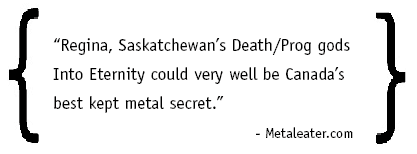
When asked if he’d like to share any advice, Tim reflects, “You gotta think big. You have to play outside your home town – Tour. Get a small demo together. Call up the clubs yourself. Build your fanbase.” He continues, “You can’t (just) have a local mindset – you have to think big picture. There are no rules, but that’s what we did.”
As for this hometown, Tim has no intentions to live anywhere but Regina. “The stuff we’ve seen, the extreme, extreme poverty…Serbia and Bosnia, where there are bullet holes in the buildings, and no electricity…that’s the reality. I can live here and support a family. I didn’t (appreciate it) when I was growing up, but my attitude’s completely changed. I’ve seen the rest of the world. Traveling has changed everything about how I look at life.”

